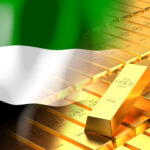The United Arab Emirates (UAE) has taken a pivotal step towards enhancing transparency in its gold sector. As a leading global hub for gold trade, the UAE, particularly through Dubai, is positioned at the center of international scrutiny over concerns related to money laundering, illicit gold sourcing, and regulatory oversight. To address these issues, the UAE has implemented a series of compliance initiatives that signal its commitment to a more transparent and ethical gold market. These measures include strict regulatory crackdowns, collaboration with international entities, and the establishment of compliance standards that aim to set a benchmark for the industry.
The Significance of the UAE in the Global Gold Market
The UAE’s gold market, especially Dubai’s, is among the largest in the world, controlling a significant share of international gold trade. Often referred to as the “City of Gold,” Dubai’s strategic location, tax-free zones, and efficient infrastructure have established it as a preferred destination for gold trading and refining. The city’s trading volumes can surpass $150 billion annually, underscoring its global importance. However, Dubai’s prominence has also made it a point of interest for international regulators and organizations focused on tackling issues such as illicit sourcing and financial crime.
Over the years, there have been concerns about gold sourced from regions plagued by illegal mining and smuggling, particularly from African countries. Reports, such as one from the Swiss non-profit Swissaid in 2022, noted that much of the gold imported from Africa into the UAE may be linked to illegal activities or unregulated sources. These revelations have not only impacted the UAE’s global standing but also attracted the attention of regulatory bodies worldwide, including those in the United States and Europe, prompting the UAE to take decisive action to protect its reputation and align with international standards.
Recent Crackdowns and Regulatory Measures
In August 2024, the UAE made a bold move by temporarily suspending 32 gold refineries due to non-compliance with anti-money laundering (AML) regulations. These facilities were found to have violated regulatory requirements by failing to assess risks properly and not verifying their clients’ identities against watchlists for terrorism and financial crimes. The UAE’s Ministry of Economy has led these crackdowns, conducting intensified inspections and enforcing regulations aimed at curbing illicit activities within the gold trade.
These suspensions are part of a broader initiative by the UAE to reform its financial market and prevent potential reputational damage. The suspended refineries represent about 5% of the UAE’s gold sector, underscoring the government’s commitment to addressing these issues even if it means disrupting business operations temporarily. By enforcing these measures, the UAE demonstrates its commitment to ethical practices, transparency, and adherence to international AML standards.
Strengthening International Collaboration for Compliance
The UAE has not limited its compliance efforts to domestic measures; it has also established stronger collaborations with international regulatory bodies. Switzerland, as one of the world’s largest gold refining hubs, has voiced its concerns about ethical sourcing within the UAE’s gold industry. As a major destination for UAE-exported gold, Switzerland’s scrutiny has prompted the UAE to adopt more stringent regulations to meet the ethical and legal standards expected by global markets.
This collaboration underscores the UAE’s alignment with Western countries’ expectations regarding transparency and regulatory compliance. As the UAE enhances its AML and compliance framework, it reinforces its standing as a trustworthy trade partner and attracts more credible investors to its market. For instance, many Western companies now seek partners in Dubai’s gold sector that can demonstrate robust compliance practices, as sanctions from Western nations target entities suspected of facilitating financial crimes or trading with jurisdictions under sanction.
Impacts of Compliance Initiatives on the Gold Industry
The UAE’s focus on regulatory compliance is likely to create both opportunities and challenges for the industry. On the one hand, these reforms can cause short-term operational disruptions, especially for small and medium-sized refineries that may struggle to meet the increased compliance costs. These businesses may need to invest in new compliance technology, update their internal processes, and provide additional training for employees to adhere to the latest AML and ethical sourcing standards.
For larger, established players, however, these changes represent an opportunity to strengthen their market position. Companies that adopt best practices in transparency and compliance can differentiate themselves in an increasingly competitive and scrutinized industry. By proactively embracing these reforms, these businesses can secure partnerships with Western markets and attract clients who prioritize ethical sourcing and transparent business practices. The UAE’s stringent standards may also help stabilize the gold sector by attracting reputable players and reducing the influence of non-compliant entities.
The Path to a Sustainable and Transparent Future
The UAE’s regulatory initiatives mark the beginning of a transformative era for its gold sector. By prioritizing transparency and ethical compliance, the UAE is not only responding to international pressures but also setting a new standard for global gold trading. These changes are aligned with the UAE’s Vision 2030, a strategic plan that emphasizes sustainable growth, economic diversification, and a commitment to high regulatory standards.
As the UAE strengthens its AML and ethical sourcing frameworks, it is likely to establish itself as a model of transparency in the gold trade. The UAE’s strategic approach to reform can attract long-term investments, fostering a stable, ethical, and sustainable gold industry. Moreover, as the UAE maintains its status as a leading gold trading hub, its commitment to ethical practices may encourage other countries to implement similar reforms, raising global standards for transparency in the gold sector.
The UAE’s recent compliance initiatives and regulatory crackdowns signify a proactive stance in addressing longstanding issues within its gold industry. These reforms, although challenging for some industry players, ultimately serve to enhance the UAE’s reputation as a trustworthy and transparent gold-trading hub. By aligning with international AML standards, strengthening partnerships with global regulators, and implementing ethical sourcing practices, the UAE is paving the way for a future where transparency and trust are paramount in the gold industry.
For stakeholders, investors, and compliance-conscious businesses, these regulatory changes signal that the UAE is serious about its commitment to creating a more accountable and ethical market. As these reforms take root, the UAE’s gold industry is poised to become a global benchmark for transparency and ethical trading, reinforcing its central role in the global economy and its attractiveness as an investment destination.






